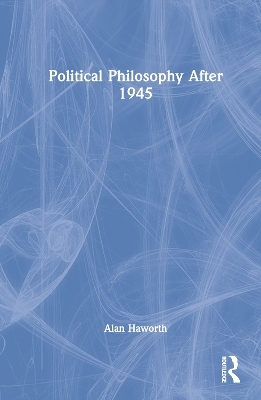
Political Philosophy After 1945
Seiten
2022
Routledge (Verlag)
978-1-138-08466-7 (ISBN)
Routledge (Verlag)
978-1-138-08466-7 (ISBN)
Alan Haworth skilfully blends assessment of the ideas of important philosophers and political theorists with analysis of fundamental concepts in political philosophy such as freedom, justice and reason, making Political Philosophy After 1945 an ideal text for students studying political philosophy and political theory.
By the mid-twentieth century interest in political philosophy had dwindled, with one writer even pronouncing the subject ‘dead’. Things were to change in 1971, when the subject experienced a renaissance with the publication of John Rawls’s A Theory of Justice. The story didn’t end with Rawls however, as other avenues through which to approach the subject became available.
In Political Philosophy After 1945 Alan Haworth tells the story of political philosophy from the mid-twentieth century to the early twenty-first. First, he considers why the subject should have become marginalised by mainstream philosophical movements such as logical positivism and the ‘ordinary language philosophy’ inspired by Wittgenstein. Subsequent chapters explain the fundamentals of Rawls’s theory, and then compare and contrast his contribution with that of other philosophers from across the political spectrum. These are followed by chapters in which alternative approaches are examined. There are in-depth accounts of works by Hannah Arendt and Alasdair MacIntyre, as well as an evaluation of the claim that political philosophy exemplifies the pursuit of a moribund ‘Enlightenment project’.
Throughout the book, Haworth strikes a balance between historical perspective and close analysis of major texts, and he is careful to emphasise the relevance of theoretical issues to questions which arise beyond theory. As such, Political Philosophy After 1945 is essential reading for students and scholars of political philosophy, but also serves as an introduction for students from across the Humanities and Social Sciences approaching the topic for the first time.
By the mid-twentieth century interest in political philosophy had dwindled, with one writer even pronouncing the subject ‘dead’. Things were to change in 1971, when the subject experienced a renaissance with the publication of John Rawls’s A Theory of Justice. The story didn’t end with Rawls however, as other avenues through which to approach the subject became available.
In Political Philosophy After 1945 Alan Haworth tells the story of political philosophy from the mid-twentieth century to the early twenty-first. First, he considers why the subject should have become marginalised by mainstream philosophical movements such as logical positivism and the ‘ordinary language philosophy’ inspired by Wittgenstein. Subsequent chapters explain the fundamentals of Rawls’s theory, and then compare and contrast his contribution with that of other philosophers from across the political spectrum. These are followed by chapters in which alternative approaches are examined. There are in-depth accounts of works by Hannah Arendt and Alasdair MacIntyre, as well as an evaluation of the claim that political philosophy exemplifies the pursuit of a moribund ‘Enlightenment project’.
Throughout the book, Haworth strikes a balance between historical perspective and close analysis of major texts, and he is careful to emphasise the relevance of theoretical issues to questions which arise beyond theory. As such, Political Philosophy After 1945 is essential reading for students and scholars of political philosophy, but also serves as an introduction for students from across the Humanities and Social Sciences approaching the topic for the first time.
Alan Haworth is a Senior Research Associate (emeritus) of London Metropolitan University. He is the author of numerous articles, and his books include Totalitarianism and Philosophy (2020), Understanding the Political Philosophers (second edition, 2012), Free Speech (1998), and Anti-Libertarianism (1994). All are published by Routledge.
1. Introduction: Death by Language? Part I 2. A Case Study: Logical Positivism 3. A Note on Expectations 4. ‘Ordinary Language' and Political Philosophy Part II 5. The Rawlsian Renaissance 6. Rawls: Comparisons and Contrasts 7. Patterns of Thought 8. The Liberal Self 9. Historicism: The Self Through Time 10. Postscript. References Index
| Erscheinungsdatum | 25.10.2022 |
|---|---|
| Verlagsort | London |
| Sprache | englisch |
| Maße | 156 x 234 mm |
| Gewicht | 280 g |
| Themenwelt | Geisteswissenschaften ► Geschichte |
| Geisteswissenschaften ► Philosophie ► Ethik | |
| Sozialwissenschaften ► Politik / Verwaltung | |
| ISBN-10 | 1-138-08466-2 / 1138084662 |
| ISBN-13 | 978-1-138-08466-7 / 9781138084667 |
| Zustand | Neuware |
| Haben Sie eine Frage zum Produkt? |
Mehr entdecken
aus dem Bereich
aus dem Bereich
unsere kollektive Verantwortung
Buch | Hardcover (2023)
wbg Theiss in Wissenschaftliche Buchgesellschaft (WBG) (Verlag)
35,00 €


